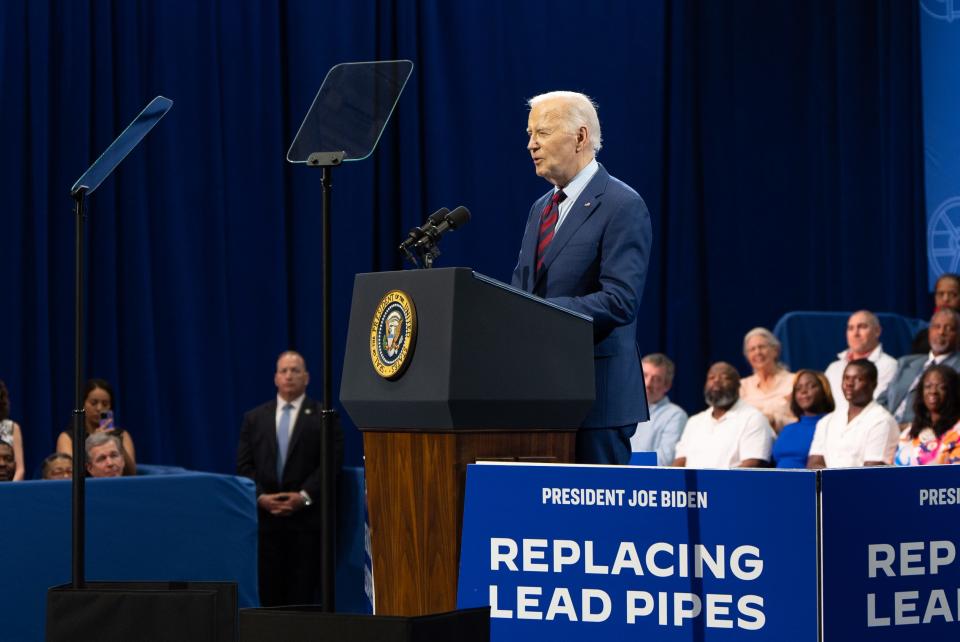NC front and center in Biden push to replace lead lines: The state has 300,000 of them
- Oops!Something went wrong.Please try again later.
- Oops!Something went wrong.Please try again later.
Many Democrats have been frustrated by the White House’s inability to convince the public that the Biden administration is enacting policies that will improve their lives. This disconnect is a bad sign in an election year, and it could be one reason why President Biden recently made visits to North Carolina. One of this year’s top electoral issues could be clean water.
The White House’s initiatives offer a striking contrast with Donald Trump and other powerful actors in the Republican Party. Weeks ago, White House officials released new rules to address contamination from “forever chemicals,” and chose Cumberland County, North Carolina, which has been impacted by the chemicals, to make the announcement. But the more visible campaign is centered around their plan to replace dangerous lead pipes around the country — an issue that should resonate in North Carolina.

The EPA estimates that North Carolina has 300,000 lead lines that need to be replaced — which explains why President Biden was in Wilmington recently to announce a new $76 million investment to replace those pipes; in total, the White House says it has provided $250 million towards achieving those goals so far, and that includes millions of dollars to remove lead hazards from schools and childcare centers across the state.
More: Lead water pipes still pose a health risk across America. The EPA wants to remove them all
More: EPA head Michael Regan returns to NC, announces new standards for 'forever chemicals'
There is no doubt about the dangers of lead, a neurotoxin linked to increased learning disabilities, hyperactivity or attention deficit disorders, seizures and reproductive harm. Last November, the EPA proposed rules that would require most water systems to replace lead lines over a 10-year period and lower the action level from 15 parts per billion (ppb) to ten. Right now, there are water systems across the country using federal aid to clean up our drinking water systems.
No action: Trump ‘Infrastructure Week’ a joke
By contrast, the Trump administration did little to prioritize clean water. They weakened the lead-in-water rule, and famously sought to dramatically curtail the Clean Water Act itself. Under the Trump administration, “Infrastructure Week” was little more than a recurring joke. The Biden administration, on the other hand, actually passed an infrastructure law that provides about $50 billion for water infrastructure, including $15 billion in funding dedicated to replacing lead lines.

And the Republican opposition to cleaning up America’s drinking water goes deeper than Trump. A group of Republican state attorneys general recently penned a joint letter objecting the Biden administration’s lead rule, arguing the benefits “may be entirely speculative” and it would “infringe on the rights of the States and their residents.” All told, it is a rallying cry that amounts to, ‘Let them drink lead.’
Is it really the case that a political party is adamant about opposing clean water policies that improve public health and create good local jobs? It would seem so, and it is a curious contrast to draw in the months ahead of a presidential election.
$60 billion price tag
Now, there is one sliver of truth in this Republican opposition to lead pipe removal: the price tag. While the bipartisan infrastructure plan dedicates $15 billion to these programs, the full cost to replace all lead lines is closer to $60 billion.
The Republican position seems to be do nothing, or close to it. But if you are concerned about improving public health, you find a way to secure more funding. The truth is that it would be unfair and unwise to leave it up to states and municipalities to foot the bill; the communities most severely impacted by lead contamination do not have the funds to fix the problem.

There is legislation that will address these and other issues. The WATER Act, introduced by Sen. Bernie Sanders and Rep. Bonnie Watson Coleman (D-NJ) would devote $35 billion every year to replace lead pipes, repair crumbling infrastructure and update treatment facilities to make sure everyone in the country has clean, safe water. Already cosponsored by more than 100 Congressmembers, the WATER Act is the kind of big picture legislation that will create thousands of good jobs and secure clean water for all.
Wenonah Hauter is the executive director of Food & Water Action, the political and lobbying arm of the national advocacy group Food & Water Watch.
This article originally appeared on The Fayetteville Observer: NC spotlighted in Biden effort to clean up the nation’s water

